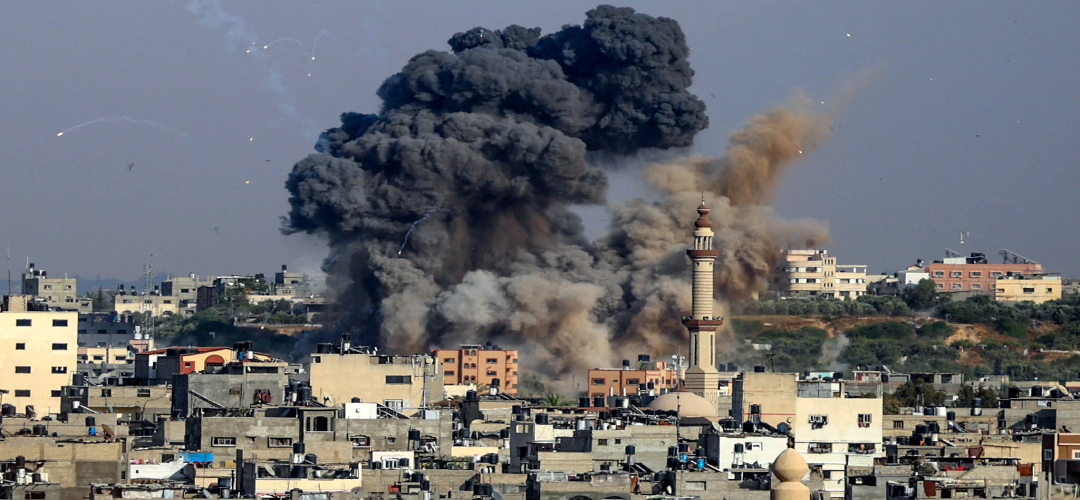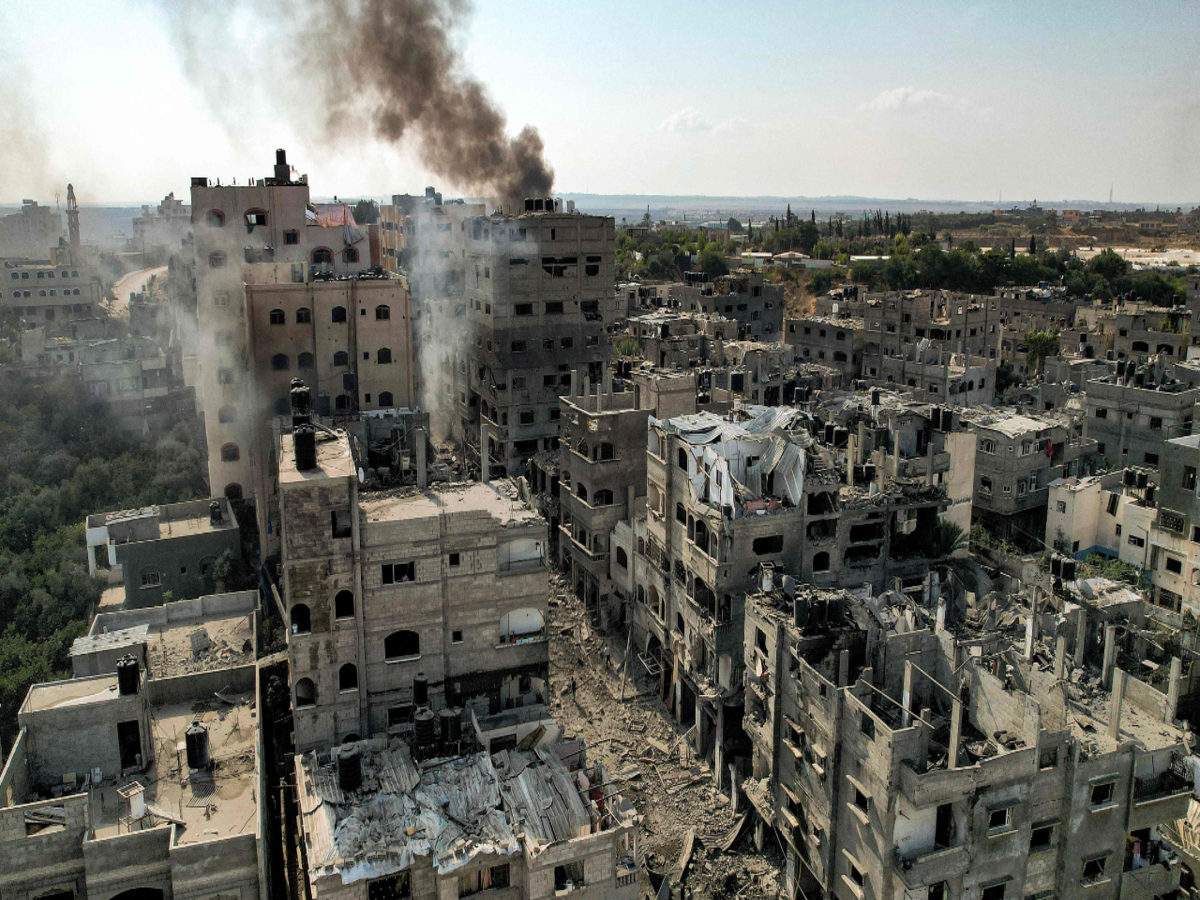A Wider Conflagration
October 14, 2023 | Expert Insights

Even though no quick-fix solution to the intractable Palestine question was expected any time soon, the common perception was that the Middle East was on its way to mend. As Arab countries queued to recognise Israel, even though the Palestinians stayed out of the equation, the hope was that stability would also ultimately benefit the Palestinians. Once the state of Israel was coupled economically and diplomatically with its Arab neighbours and its security assured, it would be more sympathetic to the genuine rights of the Palestinians to an independent homeland.
Alas, all these hopes were dashed in a burst of blazing gunfire as the day broke last Saturday. With over 1,500 Israelis, including older adults, women and children, brutally executed ISIS-style, the country's thirst for revenge has ignited. Unless that is quenched, the killing will continue. Israel, never to hold back its riposte, retaliated with heavy and unrestricted force, killing nearly 2000 Palestinians in less than a week. As the world rapidly gets segregated into two camps, anti and pro-Israel, the global geopolitical situation takes a tumble.
So, what does the future hold? This is a problematic insight to glean from amidst all the madness that seems to have gripped humankind and no one has any clue how bad the situation will turn.
Background
The wars that have kept the Middle East on the boil- from 1948 onwards to date- need no repeating. The critical issue on hand is to seek solutions for return of peace in a land that is tragically the holiest- of- holy for three of the world's most influential religions, yet so bloodstained.
The conflict between the principal protagonists has undergone various transformations- from small scale revenge raids to full scale conventional wars to more precise, high tech surgical strikes. In the last couple of year, it has gone hybrid and an unmitigated fifth generation was if being waged, with a global audience not just a spectator but also a distant participant.
Naturally, adapting to the change in the nature of warfare, the resistance by the Palestinians too has transformed, keeping pace with its enemy, and at times taking a lead, like we saw last 7th of October. The moderate and secular resistance movement of the Palestinian Liberation Organisation (PLO), whose dynamic leader Yasser Arafat received state honours in global capitals including New Delhi, weathered away and became irrelevant, replaced by a young, fanatic cadre of religious zealots, ready to attack even when death was the only surety. The successor to the PLO, the Palestinian Authority (PA), remains confined to the West Bank, a weak, corrupt and ineffective organisation under its 87-year-old President Mahmoud Abbas. Surviving on handouts by the West and wealthy Arab countries, the PA's voice is rarely heard. The current conflict has ripped away even the few vestiges of authority that PA professed.
While the Israeli Defence Force (IDF) honed its skills in keeping the Hama and the Hezbollah at bay and built a multibillion-dollar wall to keep Hama raiding parties out of its border areas, the non-state actors across the same border were not idle. Unable to match Israel's air power, the best in the region, Hamas fabricated crude rockets and compensated for their lack of accuracy and explosive weight with sheer numbers. On Saturday, over 5000 were fired within 20 minutes in an opening barrage to shock and awe the unsuspecting defenders of Israel.
Accustomed to frequent air raids and precision strikes by Apache helicopters on their command posts, Hamas went below the surface, burrowing deep under the high-rise apartment blocks, constructed from the ‘development funds’ received from EU and other donors. They now operate from a maze of tunnels, immune from the prying eyes of Israeli drones and the rain of hellfire missiles. As the IDF constructed its formidable, sensor-imbedded wire-concrete-steel wall, the Hamas was already working upon tactics to breach them. That these tactics worked needs no elaboration after what happened last Saturday. But this did not happen overnight, as claimed by an unidentified senior Hamas commander speaking on the social media. Selected cadre were trained and rehearsed in their operational manoeuvres (allegedly in Lebanon under the watchful eyes of battle-hardened Hezbollah cadres) for over six months, till the dawn of the fateful Saturday. Operational secrecy was top notch and until the launch, the Hamas Commander boasted, not more than “the number of fingers that are in one’s hand” individuals were aware of "Operation Al-Aqsa Flood", although Egypt is claiming that it has passed intelligence about the attack to Israel at least six times in the recent past.

Analysis
The latest attacks by Hamas should not come as a surprise. This is only a part of an ongoing mini-war since the Islamists came to power in the Gaza Strip in 2007. Skirmishes have taken place in 2008, 2014 and 2022 with varying degree of intensity although none were as sophisticated or as successful as the latest one. Rocket strikes are frequent and now accepted as a way of life by the stoic Israeli settlers. Israel responds with air strikes and honour satisfied; life goes on. However, this time Israel has been shamed and hurt deeply; it will take much to restore the uneasy peace that prevailed before October 7th.
All these confrontations between Israel and Hamas did not occur in a vacuum; there is a wider geopolitical context. The two heavyweights in the region, Iran and Saudi Arabia see themselves as hegemons in their neighbourhood. As the heart of the Muslim and Arab worlds, Saudi Arabia has always had a special relationship with the Palestinian issue. It has never played a direct role in any Arab-Israeli or Israeli-Palestinian wars. What it has lacked in arms, it has more than made up in terms of financial support.
However, all is not well between the Saudis and the fanatic Palestinian armed cadres like Islamic Jihad and Hamas, especially because these groups openly hob-nob with Iran and Hezbollah. Riyadh is also concerned that this virus of radicalism should not infect its restive population, especially those in the peripheries of the Kingdom. On the backstreets, away from the glitter of ultra-modern Riyadh and in the remoter less prosperous settlements, there is a strong sentiment supporting the Palestinian cause. This makes any concessions to Israel fraught with political risk.
However, Saudi Arabia is led by a young leadership that is modern in its outlook and recognises the need to change the economy of their kingdom from oil dependence to modern services and manufacturing. For this, they need the investments, technology and markets of the West, and in this Israel is an integral piece of the larger economic exercise. Turning off the oil tap, as they did in 1973, is no longer a viable option as the international situation may not allow it. They cannot fiddle with the market forces of supply and demand without getting hurt themselves in a connected global world economy.
So, the Saudis have played a balancing act concerning the Palestinian issue. They have never openly threatened Israel. This balancing policy has given Riyadh a certain level of flexibility in its dealings with Israel.
The Iranian case is quite different from this. Under Shah Muhammad Reza Pahlavi, Iran was a strong ally of Israel. It maintained covert relations with the Jewish state at the time. The Shah never joined the Arab boycott of Israel. Even at the height of the energy embargo in 1973, Iran did not use oil as a weapon. Israel lost all influence in this country when the Shah was finally overthrown in a popular revolution. An anti-Israeli Islamic government replaced the Shah and has vociferously mounted its opposition to the Zionist ideology of Israel.
In 1980, Hamas was founded as the local branch of the larger organisation of the Muslim Brotherhood, which was spreading throughout the Arab world. Initially, Hamas maintained a low profile projecting itself as a buffer against the secular PLO while it quietly developed its organisational and operational capacity. The Palestinian society was boiling over under the unrelenting occupation of the Israelis which came to a head in 1989 when the First Intifada broke out. Hamas was at the forefront of this first national uprising by the Israelis.
With the end of the Iran-Iraq war in a stalemate that favoured Iran and drained out Iraq, Teheran could expand its influence in the region. A convergence of interests emerged between Hamas and Iran, becoming an institutional relationship. The Arab-Israeli rapprochement, including the Abraham Accords, threatened to significantly change the face of the Middle East with the Palestinians conspicuous by their absence in the entire deal. Herein lies the motive for "Operation Al-Aqsa Flood".
So how will things turn out? With the Western world firmly behind Israel, an early cessation of hostilities is remote. If things go along a predictable path, Israel will slacken its bombardment of Gaza once its 150 prisoners have been swapped or have been taken out of the equation by Hamas. But the mutual hatred and suspicion will continue to simmer as hither to fore, with neither side giving up any passing opportunity to hurt the other. Long-term peace in Palestine appears no where on the horizon, perhaps for a very long time. Arab nations, who wanted to mend fences with Israel will be forced to withdraw the hand of friendship under a rising tide of anti-Zionist sentiment running like a wildfire in the entire Muslim world. This anger will find an outlet in many deadly ways, impacting the West and its friends like India which have a sizeable Muslim population. The Middle East is in for a long period of turmoil.
India, which has friends on both sides of the battle line, is caught in the middle. It runs the risk of offending the Arab countries who, over the last decade, have become exceptionally appreciative of India's newfound global standing. And worse, the ambitious India Middle East Economic Corridor (IMEEC) appears to be a stillborn baby. Reviving it will be a long-drawn process at best.
As for India's strategic ally, the Economist magazine posed a relevant question, “ Will Israel’s agony and retribution end in chaos or stability?” Very few have an answer today.
Assessment
- The leading players in this war are Israel and Hamas. But they are not the only players, as they do not control their destiny. The West that supports Israel, and the oil money that arms Hamas must be addressed to bring peace. However, as Iran, the wild card, flexes its muscles and makes Israel its principal enemy, peace may be harder to come.
- The national interests of individual nations have subsumed those of the Palestinians, and the ‘two nation theory” lies in tatters. Hamas has proclaimed, rather emphatically, that they will not fade away quietly into the margins of history.
- The only positive outcome of all this bloodletting, when it finally slows, could be a realisation on the part of Tel Aviv that status quo ante is no longer an option. It may be a bitter pill to swallow, but some difficult concessions will have to be made territorially to buy peace. However, Tel Aviv would need rock-solid guarantees for its part of the bargain; can anyone underwrite such a deal in this unstable world?








Comments